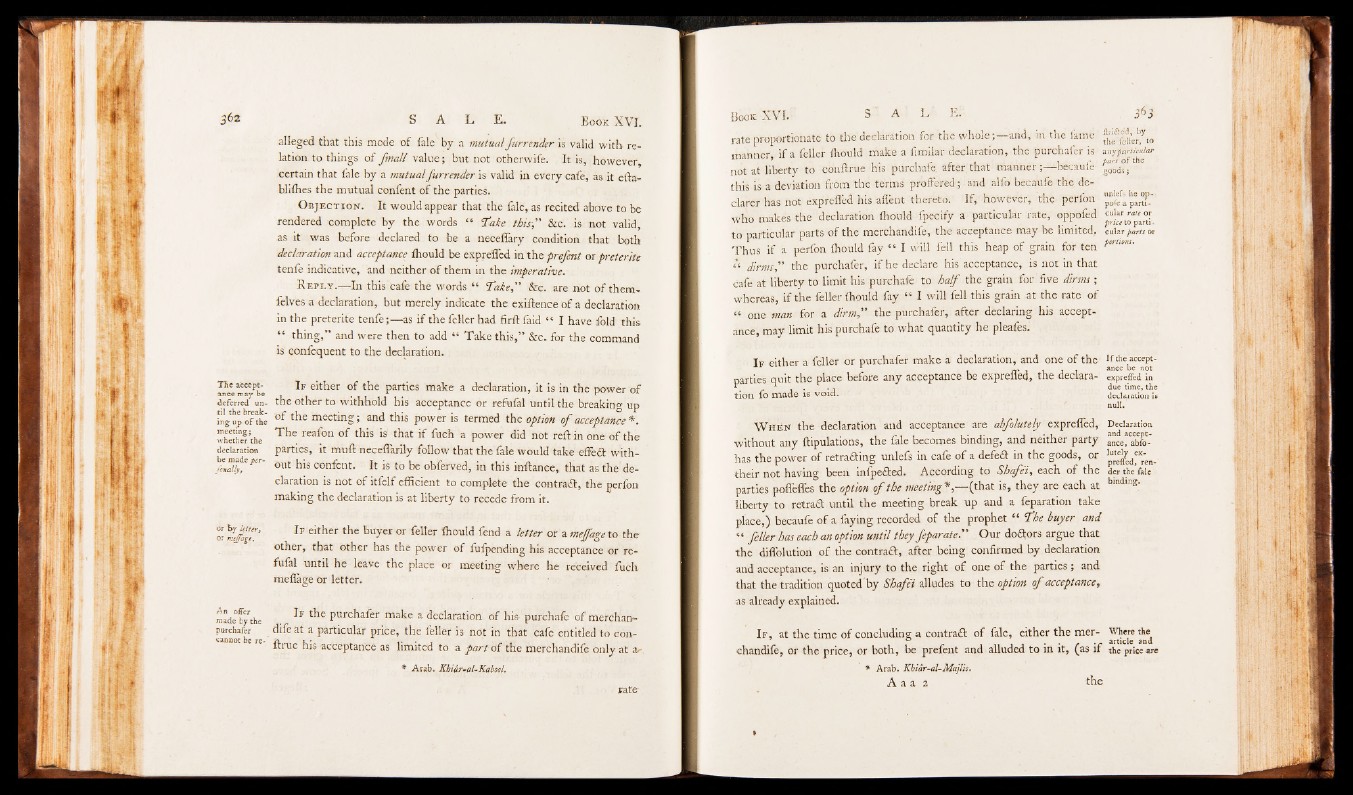
The acceptance
may be
deferred until
the breaking
up-of the
meeting j
whether the
declaration
be made per-
jcnally,
Or by letter,
or meffagel
offer
made by the
purchafer
cannot be realleged
that this mode of fale' by a mutual fu r render is valid with relation
to things of fmall value; but not otherwife. It is, however
certain that fale by a mutualftrrender is valid in every cafe, as it efta-
blifhes the mutual confent of the parties.
O b j e c t io n . It would appear that the fale, as recited above to be
rendered complete by the words “ ‘Take this ” &c. is: not valid,
as it was before declared to be a neceffary condition that both
declaration and acceptance fhould be expreffed in the prefent or preterite
tenfe indicative, and neither of them in the imperative.
R e p l y .— In this cafe the words “ Take” &c. are not of them-
felves a declaration, but merely indicate the exigence of a declaration
in the preterite tenfe;— as if the feller had firft faid “ I have fold this
“ thing,” and were then to add “ Take this,” &c. for the command
is confequent to the declaration.
If either of the parties make a declaration, it is in the power of
the other to withhold his acceptance or refufal until the breaking up
of the meeting; and this power is termed the option o f acceptance *.
The reafon of this is that if fuch a power did not reft in one of the
parties, it muft neceffarily follow that the fale would take effeft without
his confent. It is to be obferved, in this inftance, that as the declaration
is not of itfelf efficient to complete the contrail, the perfon
making the declaration is at liberty to recede from it.
If either the buyer or feller fhould fend a letter or a meffage to the
other, that other has the power of fufpending his acceptance or refufal
until he leave the place or meeting where he received fuch
meflage or letter.
If the purchafer make a declaration of his purchafe of merchan-
dife at a particular price, the feller is not in that cafe entitled to con-
ftrue his acceptance as limited to a part a t the merchandife only at a-
* Arab. Khiar-aUKabool
rate
rate proportionate to the declaration for the whole;— and, in the fame
manner* if a feller fhould make a limilar declaration, the purchafer is
not at liberty to eonftrue his purchafe. after, that manner becaufe
this is a deviation from the terms proffered; and alfo becaufe the declarer
has not exprefled his aflent thereto. If, however, the perfon
who makes the declaration fhould fpecify a particular rate, oppofed
to particular parts of the merchandife, the acceptance may be limited,
Thus if a perfon fhould fay “ I will fell this heap of grain for ten
“ dirms,” the purchafer, if he declare his. acceptance, is not in that
cafe at liberty to limit his purchafe to half the grain for five dirms ;
whereas, if the feller fhould fay “ I will fell this grain at the rate of
“ one man for a dirm,” the purchafer,, after declaring his acceptance,
may limit his purchafe to what quantity he pleafes.
If either a feller or purchafer make a declaration, and one of the
parties quit the place before any acceptance be expreffed, the declaration
fo made is void.
W h e n the declaration and acceptance are abfolutely expreffed,
without any ftipulations, the fale becomes binding, and neither party
has the power of retracing unlefs in cafe of a defeat in the goods, or
their not having been infpefted. According to Shcfei, each of the
parties poffeffes the option o f the meeting* ,— (that is, they are each at
liberty to re ta il until the meeting break up and a feparation take
place,) becaufe of a faying recorded of the prophet “ The buyer and
“ feller has each an option until they feparate.” Our doctors argue that
the diffolution of the contrail, after being confirmed by declaration
and acceptance, is an injury to the right of one of the parties ; and
that the tradition quoted by Shqfei alludes to the option o f acceptance,
as already explained.
I f , at the time of concluding a contrail of fale, either the merchandife,
or the price, or both, be prefent and alluded to in it, (as if
* Arab. K h ia r-a l-M a jlis.
A a a 2
Eri&ed, by
the feller, to
an f particular
part of the
goods;
unlefs he op-
pofe a particular
rate or
price to particular
parts or
portions.
If the acceptance
be not
expreffed in
due time, the
declaration is
null.
Declaration
and acceptance,
abfolutely
expreffed,
render
the fale
binding.
Where the
article and
the price are
the